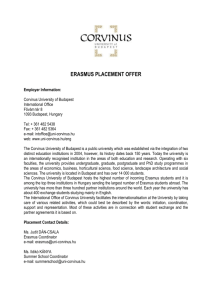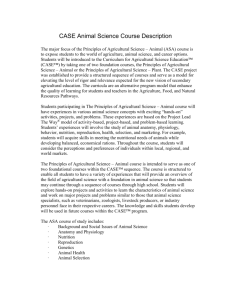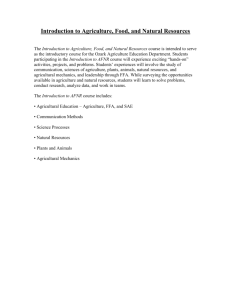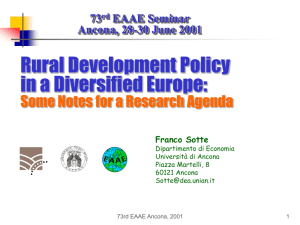Agricultural Economics and Transition: What was (Hungary)
advertisement
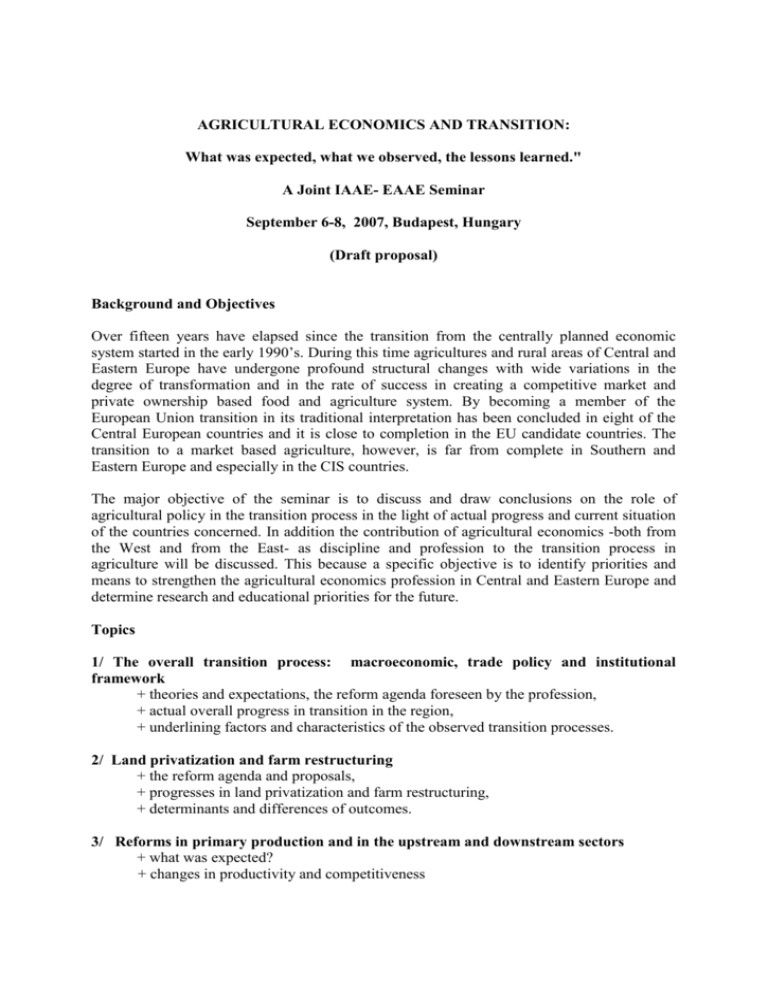
AGRICULTURAL ECONOMICS AND TRANSITION: What was expected, what we observed, the lessons learned." A Joint IAAE- EAAE Seminar September 6-8, 2007, Budapest, Hungary (Draft proposal) Background and Objectives Over fifteen years have elapsed since the transition from the centrally planned economic system started in the early 1990’s. During this time agricultures and rural areas of Central and Eastern Europe have undergone profound structural changes with wide variations in the degree of transformation and in the rate of success in creating a competitive market and private ownership based food and agriculture system. By becoming a member of the European Union transition in its traditional interpretation has been concluded in eight of the Central European countries and it is close to completion in the EU candidate countries. The transition to a market based agriculture, however, is far from complete in Southern and Eastern Europe and especially in the CIS countries. The major objective of the seminar is to discuss and draw conclusions on the role of agricultural policy in the transition process in the light of actual progress and current situation of the countries concerned. In addition the contribution of agricultural economics -both from the West and from the East- as discipline and profession to the transition process in agriculture will be discussed. This because a specific objective is to identify priorities and means to strengthen the agricultural economics profession in Central and Eastern Europe and determine research and educational priorities for the future. Topics 1/ The overall transition process: macroeconomic, trade policy and institutional framework + theories and expectations, the reform agenda foreseen by the profession, + actual overall progress in transition in the region, + underlining factors and characteristics of the observed transition processes. 2/ Land privatization and farm restructuring + the reform agenda and proposals, + progresses in land privatization and farm restructuring, + determinants and differences of outcomes. 3/ Reforms in primary production and in the upstream and downstream sectors + what was expected? + changes in productivity and competitiveness + dramatic changes in vertical and market relations[would’nt “vertical relations” be sufficient? Is there any difference between vertical relations and market relations? Maybe I miss something but I don’t understand the distinction], + critical lessons. 4/ EU accession experiences + a priori impact analysis, + observed outcomes so far, + results in the lights of predictions: what did we learn?. 5/ What was the contribution of the profession? + adequacy of proposals and predictions, + where we were right? + where we were wrong? + was the profession prepared? + priorities for the future/in research, training and research and in advocacy/ (??) Call for papers Both contributed and invited papers will be presented at the Seminar. Contributed papers will be selected by an International Program Committee. Participants who would like to present a paper are requested to submit an extended abstract (*** words/double spaced pages maximum, everything included) by January 31st, 2007. Notification of acceptance will be given by March 15th, 2007. The deadline for the final submission of the accepted papers is June 30th, 2007. Language The working language of the seminar will be English Organization The seminar will be organized under the auspices of IAAE and EAAE as an IAAE Inter Conference Seminar and an EAAE European Seminar. Local organizer is the Corvinus University of Budapest in cooperation with the Hungarian Agricultural Economics Association, the Hungarian Society of Agricultural Science, the Hungarian Academy of Science, the Agricultural Research Institute, the Szent István University, Gödöllő and the University of Debrecen. Participants 60-80 participants are expected to attend. Registration is accepted on first comes first served basis Registration Participants are asked to pre-register by March 31th, 2007. registration is June 30th, 2007. The deadline for final Participation Fees The fees have been set at 240 € and include an information package, coffee breaks, 2 lunches, welcome reception, farewell party, a book of Abstracts and conference pack. Non EAAE/IAAE members have to pay for their EAAE (€ 40) or IAAE membership fee (€ 165). Fees paid before June 30th, 2007 EAAE or IAAE Non-EAAE/IAAE Members Members but joining to EAAE IAAE € 240 € 280 € 405 Fees paid after June 30th, 2007 € 280 € 320 € 445 Cancellation Policy If cancellation is confirmed by July 15th, 2007 (note: only written cancellation by fax or email will be accepted for refund purposes), fees will be refunded less a cancellation fee of 50 Euro. In the case where the candidate has omitted to inform us of cancellation, no fees will be refunded. Financial support: Financial support will be available for colleagues from transition countries having accepted paper. For them, based on request, registration fee will be paid by organizers. One day farm tour: there will be a field trip on Saturday, September 6, 2007. Fee: €40 Accommodation will be available at hotels located in the city centre nearby the venue of the Seminar. Room rates: Single room: € 65-110 Double room: € 75-120 Venue: Corvinus University of Budapest, Budapest IX. Fővám tér 8. International Program Committee David Coleman (Co-Chair) (Manchester University) Csaba Csáki (Co-Chair) (Corvinus University of Budapest) Eugenia Serova (Analytical Centre for Agrifood Economics, Moscow) Jo Swinnen (Chatolic University, Leuven) Jerzy Wilkin (Warsaw University) Ulrich Koester (Kiel University) Local Organizing Committee Csaba Forgács (Co-Chair) (Corvinus University of Budapest) Zoltán Lakner (Corvinus University of Budapest) András Nábrádi (University of Debrecen) József Popp (Agricultural Research Institute) Istvan Szücs (Co-Chair) (Szent István University) József Tóth (Corvinus University of Budapest) Gábor Udovecz (Agricultural Research Institute) László Vajda (Ministry of Agriculture and Rural Development) László Villányi (Szent István University, Gödöllő) Krisztina Fodor/Attila Jámbor (Secretary) For further information please contact: Prof. Csaba Forgacs E-mail: csaba.forgacs@uni-corvinus.hu Department of Agricultural Economics and Rural Development, CUB



